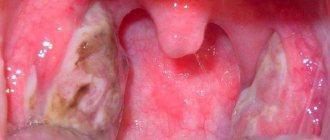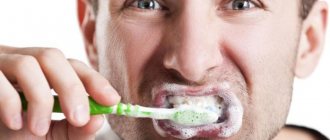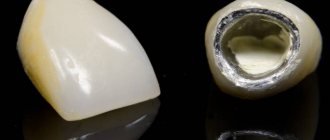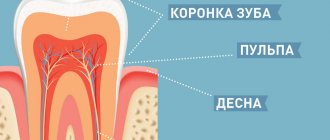Is it safe to treat your teeth when you are sick?
Most dentists are inclined to think that a visit to a doctor should be made in a healthy state, that is, without any ailments. Some doctors even advise postponing a visit to the dentist during an exacerbation of chronic diseases such as gastritis, colitis, dermatitis, etc.
The fact is that during an illness, a person’s immunity is subject to a heavy load: he has to not only cope with the infectious agent, but also take care of restoring the normal functioning of the body.
At the same time, some methods of dental treatment, for example, anesthesia, depulpation, tooth extraction (extraction), etc., also put a strain on the body’s defenses. There is no need to overstrain your immune system.
Do cold symptoms – runny nose, cough, fever – affect treatment?
Manifestations of a cold or viral disease in the form of a stuffy nose, cough, sore throat, low-grade fever in themselves cause discomfort. But in the dentist's chair it will increase several times, because you will have to sit motionless, with your head thrown back, for a long time. And at the same time breathing through your nose, which will be difficult with a runny nose. In addition, it will be difficult for the doctor to carry out manipulations if the patient has a severe cough.
“Girls, never treat your teeth when you have a runny nose! Even if you put drops in your nose before taking it. Breathing through your nose is not the main problem. The main thing will begin later in the form of gumboil. Didn’t want to postpone your treatment date by a week because of a runny nose? Get two weeks of gumboil, a course of antibiotics, drainage of pus from the gums and all 33 pleasures. It almost didn’t come to the point of surgery.”
Post by user NataPustova from the ladycity.ru forum
Even if there is no runny nose or cough, but the temperature is elevated, dentists do not recommend dental treatment on such a day. The fact is that an increase in temperature is the body’s protective response to the presence of any virus or bacteria, so an extra load on the immune system in the form of stress and drugs used by the doctor in dental treatment is undesirable. In addition, tissue regeneration during such a period is reduced, which means that after visiting the dentist there may be complications: long-term persistence of the pain effect, poor blood clotting, incorrect reaction to anesthesia.
Important! If the increase in temperature is not caused by ARVI, but by an inflammatory process in the oral cavity (for example, inflammation of the gums, gumboil, cyst formation, etc.), then treatment should be carried out immediately. This condition can lead to more serious complications, so doctors advise not to delay your visit to the clinic.
Should you go to the dentist when you have a cold?
There are no direct contraindications to the treatment of caries during ARVI. However, a qualified doctor will tell you that dental procedures can cause complications. Therefore, the question of the advisability of visiting a dentist is open. Here are some pros and cons that will help you decide whether it is worth treating your teeth if you are sick?
"Against":
- The first argument in favor of why caries cannot be treated for a cold is that you can infect the attending physician. Such a trip to the dentist can result in a serious illness for the latter and in the absence of medical care for many of his patients.
- Going to a specialist if you have a cold is associated with the risk of complications. The fact is that during a cold the body is weakened and more vulnerable to infection. When you are sick, your internal strength goes into fighting the symptoms of a cold and is no longer enough to repel other attacks. Surgical procedures in the dental chair lead to increased proliferation of bacteria in the oral cavity.
- The effect of an anesthetic on the body during illness is unpredictable. The patient may suddenly become ill in the chair, making further treatment impossible.
"Behind":
- A timely visit to the dentist will help avoid complications associated with the disease. Sometimes it is acceptable to suffer a slight cold in the chair in order to preserve the tooth or pulp inside it.
- A visit to the dentist is justified if the patient has serious dental diseases: periodontitis, gumboil, purulent and inflammatory processes. If you have one of these ailments, as well as acute “shooting” pain, you should immediately eliminate their causes.
Treatment of caries with a runny nose
Separately, it should be said about the treatment of caries with a runny nose. Here, to the above arguments “against”, another one is added: the need to sit with your mouth open and head thrown back for an indefinite period of time. Evaluate your options carefully before agreeing to this.
The best solution would be to ask the doctor himself for advice. Together with the patient, he will determine how urgent the assistance should be. The decision depends on a single criterion: which of the diseases is more serious - a cold or a dental one.
READ IN DETAIL: first aid for dental emergencies
The influence of temperature on the quality of dental treatment
Temperature is a natural reaction of the body to the inflammatory processes occurring in it. The intensified fight against infection, to which all internal resources are directed, often causes the mercury column to rise to alarming levels. Should you go to the dentist if you have a fever when your body temperature reaches 37-38 degrees? You can find the answer to this question by listening to your body and understanding why the temperature is elevated.
If the cause of the increase in temperature is the flu or ARVI, it is better to reschedule the visit to the doctor and rest at home, giving the body the opportunity to recover. However, it is worth remembering that the cause of a temperature jump can also be pathological processes in the oral cavity, for example, the formation of a cyst or deep caries. In this case, you should immediately consult a doctor.
Is it possible to remove a tooth during ARVI?
Surgeons, as a rule, do not advise a patient to remove teeth if he has symptoms of ARVI. The risk of infection of an open wound during such manipulation is very high. Even the immune system of a healthy person sometimes fails to protect itself, and complications arise. And if the immune system is loaded with the fight against the virus, then this is an almost one hundred percent guarantee of the development of complications after surgery.
Attention! Tooth extraction during a respiratory viral disease is possible only for health reasons. In this case, the surgeon must thoroughly disinfect the entire oral mucosa and surface of the teeth, as well as the patient’s lips. After removal, he treats the wound itself with antiseptic drugs, and the patient is prescribed a course of antibiotics and drugs that strengthen the immune system. It is recommended to adhere to the schedule for taking such medications throughout the entire course of treatment.
An integrated approach to the problem - delete or wait
Here the issue is resolved together with the therapist: it is necessary to remove the tooth and include antiviral drug therapy, taking painkillers in order to relieve the general symptoms of a cold, and to prevent infection from getting into the wound after tooth extraction. At the same time, the intake of immunostimulants and vitamin complexes is added to help the immune system overcome the painful condition and accelerate the improvement of the general condition.
The therapist and dentist jointly resolve the issue
Problems that the therapist and dentist solve together:
- strengthening the patient's immunity
- antiviral therapy
- antibacterial treatment of the wound after tooth extraction
- disinfection of possible wounds and cracks in the oral mucosa
- protecting the dentist himself from contracting a virus or infection
Growth on the inside of the cheek: signs, causes, treatment
Dental tissue deteriorates quickly, and if there is a question about further installation of an implant, then the wound after tooth extraction must be kept clean and healthy so that the mucous membrane is not damaged by microbes. Therefore, it is imperative to remove the tooth, taking precautions against infection of the wound, despite minor manifestations of a cold. After all, while waiting for treatment for a cold, caries damage can spread to neighboring teeth, which is very undesirable for the general condition of the teeth.
Is it possible to treat teeth if a “cold” appears on the lip?
The appearance of herpes on the lip (or, as it is called in everyday life, a “cold”) itself is rarely accompanied by malaise, fever or other symptoms. However, if a painful blister appears on the lip, this means that the body’s immunity is weakened and it does not have enough strength to contain the virus. In such cases, patients are advised to first cure herpes and take care of supporting the immune system.
In addition, the herpes virus is also dangerous because it can get from the lip through instruments to open areas: wounds on the gums or nerve canals of the tooth. This will lead to complications of treatment - stomatitis, suppuration in soft tissues, etc.
In what cases is it acceptable to treat teeth during a cold?
Dental treatment for ARVI is not recommended, but there are cases when you cannot postpone a visit to the doctor. The most striking example is the risk of periostitis (flux).
Periostitis is a purulent inflammation of the periosteum, which can provoke the development of more serious diseases. Infection of the periosteum can develop against the background of hypothermia and ARVI, acute periodontitis or pulpitis. In this case, treatment must begin immediately, before the formation of a purulent sac, otherwise intoxication of the body cannot be avoided.
Worth remembering! Sometimes painful sensations in a damaged or previously filled tooth can occur against the background of a cold and fever. As a rule, pain and discomfort go away after 3-4 days, as soon as the cold symptoms disappear.
Ways to relieve toothache
Before you begin treatment for toothache during an acute respiratory viral infection, you should consult a dentist to determine whether you can treat your teeth during a cold or not. If your doctor does not recommend visiting the dental office if you have a fever, you can take a pain reliever or use one of the following options:
- Mouth rinse . You should rinse your mouth with a saline or soda solution. The manipulation is repeated several times a day. Such mixtures have antibacterial properties, so they will help prevent the spread of infection. To reduce the inflammatory process, you can prepare a sage decoction.
- Ginger . It is necessary to apply a piece of peeled ginger root to the sore tooth.
- Menthol dragee . It should be placed under the tongue. When the dragee dissolves, an anesthetic effect will appear.
- Furacilin solution . It is recommended to rinse your mouth at least three times a day. If your gums are swollen, you need to prepare a solution of salt and soda.
Additionally, attention should be paid to the treatment of colds. As soon as the symptoms of ARVI pass, the dentist will be able to see the patient. If you still cannot reduce the toothache, or it only gets worse, you should contact your doctor. The dentist will advise you on dental treatment options during a cold.
Complications after dental treatment during a cold
Viruses most often enter the body through the mucous membrane of the throat or nose, so these tissues are the first to become inflamed. The proximity of the infected area to the treatment site increases the risk of the virus entering the tooth tissue, for example, along with saliva. This can not only slow down recovery after manipulation, but also cause complications:
- sinusitis: if a virus or bacteria enters the maxillary sinuses. This disease is very dangerous because a large amount of pus forms in the sinuses close to the eyes and brain, which leads to intoxication,
- Otitis media: If an infection enters the inner or middle ear and causes inflammation. Severe otitis media can lead to hearing loss,
- pneumonia: if the infection enters the respiratory tract, inflammation will begin in the lungs. Treatment of pneumonia is very long, and if it is started untimely, the risk of death increases,
- meningitis: viruses or bacteria enter the brain through the circulatory system, causing inflammation of its membranes. This disease is characterized by high mortality,
- osteomyelitis: when the infection spreads through the bloodstream or infected surrounding tissue to the bone tissue. The course of the disease is such that it leads to bone deformation or degeneration.
Causes of toothache due to colds
During a cold, toothache is often added to symptoms such as fever, runny nose and cough. The following can cause discomfort in the oral cavity:
- Drugs . Some medicines contain a lot of acid. These drugs include Theraflu and Antigrippin. The result of acid exposure to teeth is severe thinning of their enamel. This causes the development of caries and increased tooth sensitivity. It is recommended not to chew the tablets and to rinse your mouth regularly after meals, since during colds patients often drink tea with lemon.
- Runny nose . During illness, viruses negatively affect the respiratory tract, which leads to inflammation of the sinuses. Pressure increases in the nasal cavity as they fill with mucus. The roots of the upper teeth are located close to the maxillary sinuses, so pain may occur. You need to consult your dentist about what to do in this case. But, first of all, it is necessary to treat a runny nose.
- Dry mouth . With a stuffy nose, breathing is always difficult, as the patient begins to breathe through the mouth. As a result, the mucous membrane of the mouth dries out, and under such conditions, pathogenic bacteria act more actively on the teeth, destroying them. It is recommended to drink more fluids.
If the patient requires surgical intervention, then it is necessary to consult with a doctor whether it is possible to remove a tooth if you have a cold.











